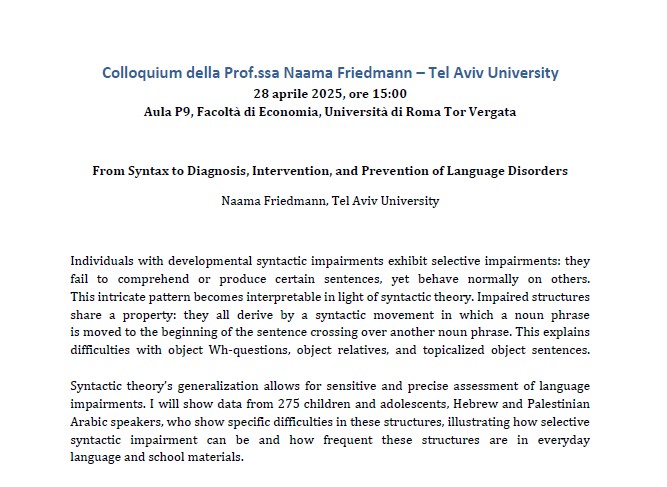
Colloquium della Prof.ssa Naama Friedmann – Tel Aviv University 28 aprile 2025, ore 15:00
Colloquium della Prof.ssa Naama Friedmann – Tel Aviv University.
28 aprile 2025, ore 15:00
Aula P9, Facoltà di Economia, Università di Roma Tor Vergata
From Syntax to Diagnosis, Intervention, and Prevention of Language Disorders
Naama Friedmann, Tel Aviv University
Individuals with developmental syntactic impairments exhibit selective impairments: they fail to comprehend or produce certain sentences, yet behave normally on others. This intricate pattern becomes interpretable in light of syntactic theory. Impaired structures share a property: they all derive by a syntactic movement in which a noun phrase is moved to the beginning of the sentence crossing over another noun phrase.
This explains difficulties with object Wh-questions, object relatives, and topicalized object sentences. Syntactic theory’s generalization allows for sensitive and precise assessment of language impairments. I will show data from 275 children and adolescents, Hebrew and Palestinian Arabic speakers, who show specific difficulties in these structures, illustrating how selective syntactic impairment can be and how frequent these structures are in everyday language and school materials.
Accurate diagnosis paves the way to tailored interventions for these syntactic structures, as well as educational adaptations sensitive to sentences that are more complicated for these individuals. I will discuss the neuropsychological underpinnings of syntactic impairments, including nutritional factors, hearing loss, and brain damage. I will conclude by showing the use of syntactic theory for neurosurgical purposes to protect language areas.
Breve bio
Naama Friedmann è una neuropsicologa di spicco presso l’Università di Tel Aviv, dove dirige il Language and Brain Laboratory e il Lieselotte Adler Laboratory for Child Development Research. È titolare della cattedra Branco Weiss in Sviluppo del Bambino e membro dell’Accademia Israeliana delle Scienze.
Le sue ricerche si concentrano sui disturbi del linguaggio, come dislessia, disgrafia e afasia.

